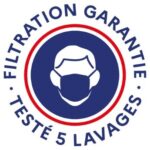Masks: how to access the french market
28/04/2020

Gaining access to the European market depends on the type of mask you wish to market. Below we set out the various types of masks, their status, and the associated regulations, which can help define the steps that need to be taken; we also describe the exceptional measures taken during the COVID-19 health crisis.
1) Masks that protect the wearer, called “FFP” masks.
These masks protect against the inhalation of airborne droplets and particles that could contain infectious agents.
There are three categories of FFP masks:
- FFP1: filtering at least 80% of aerosols (total inward leakage < 22%).
- FFP2: filtering at least 94% of aerosols (total inward leakage < 8%).
- FFP3: filtering at least 99% of aerosols (total inward leakage < 2%)
These masks are considered personal protective equipment (PPE) that must comply with the requirements of Regulation (EU) 2016/425 on personal protective equipment. The harmonised standard for these masks is NF EN 149.
Before they can be placed on the market, these masks must obtain CE certification, requiring the intervention of a notified body.
2) Masks for medical use.
These masks protect those around the wearer. They are designed to prevent the projection of saliva or secretions from the upper airways that could contain infectious agents that can be transmitted by the “droplet” or “airborne” route.
There are three types:
- Type I: bacterial filtration efficiency > 95%.
- Type II: bacterial filtration efficiency > 98%.
- Type IIR: bacterial filtration efficiency > 98% and splash-resistant.
These masks have the status of Class I medical devices (MDs) and must meet the requirements of Directive 93/42/EEC. Eventually, they will have to comply with Regulation (EU) 2017/745. The harmonised standard for these masks is NF EN 14683.
These MDs must be CE marked through self-certification, under the sole responsibility of the manufacturer, except for sterile masks. The latter are Class I(s) MDs requiring the intervention of an organisation before they can be placed on the market.
3) Non-medical or “barrier” masks, divided into two categories.
- Filtering masks for use by professionals in contact with the public (Category 1). These masks are intended for professionals who are likely to be in contact with a large number of people during their activities (cashiers, law enforcement officers, etc.). They filter more than 90% of emitted particles that are greater than or equal to 3 microns in size.
- Filtering masks for collective protection to protect a whole group wearing these masks, without any contact with the public (Category 2). These masks are intended for use by individuals who have occasional contact with others in the workplace. These masks may be worn by all individuals in a subgroup (company, department) when required by the position or working conditions. Their filtration efficiency for 3-micron emitted particles is 70 to 80%.
These new masks do not have the protection provided by the first two categories and are therefore not intended for health professionals or people exposed to the virus. However, they supplement preventive measures and social distancing rules.
They must meet the requirements set out by the ANSM in the following two opinions, including sufficient breathability for four hours of use.
The Direction Générale de l’Armement (DGA) is responsible for testing these masks, for which logos have been created to guarantee the quality of filtration and specify the number of times they can be washed.

COVID-19 health crisis: Further information
In the context of the health threat posed by COVID-19, the European Commission has adopted transitional measures under Commission Recommendation (EU) 2020/403 of 13 March 2020 temporarily facilitating access to the market for PPE and MDs under certain conditions. This Recommendation on conformity assessment and market surveillance procedures is available at:
https://eur-lex.europa.eu/legal-content/FR/TXT/PDF/?uri=CELEX:32020H0403&from=FR
It should be noted that AFNOR, ISO and the European Committee for Standardization (CEN) have decided to temporarily provide you with exceptional access, free of charge, to the standards you need to manage this health crisis.
In addition, a series of measures relating to the importation and conformity of masks has been set out in Ministerial Instructions DGT/DGS/DGCCRF/DGDDI/2020/55 of 31 March 2020 and DGT/DGS/DGCCRF/DGDDI/2020/57 of 5 April 2020 in order to simplify the procedures for controlling imported masks while ensuring an adequate level of safety. Thus, masks bearing the CE mark can be freely imported, regardless of the requisition mechanism (Decree No 2020-293 of 23 March 2020, Article 12). However, they are not for consumer use.
Moreover, a circular authorises the importation and use in France of surgical masks compliant with American and Chinese standards, and of FFP2 masks compliant with American, Chinese, Australian, New Zealand, Korean and Japanese standards, until 31 May 2020. To ensure the rapid implementation of this customs simplification, importers are requested to obtain all evidence justifying the compliance of the products they import and include it in their customs clearance files.
The customs authority has made a table of equivalent standards available:
Lastly, the ANSM has developed a temporary framework tailored to the context of COVID-19, proposing guidelines with the aim of facilitating the use of alternative medical devices while preserving patient safety, within the context of the health crisis. For example, manufacturers must carry out the necessary tests before use and in healthcare situations in order to demonstrate that the performance and safety of their product are compatible with the identified need. Once these data have been provided to the ANSM, the product is evaluated and the use of the device is authorised, as a derogation, within a very short time frame, to respond to the emergency.
Whatever the health situation, a mask must always comply with the applicable regulatory requirements for its intended use, like any product placed on the European Union market.
Efor can guide and assist you in your efforts to access the European market. Contact us via our contact form.
Efor group
Our CSR commitments
Aware of our social and environmental responsibility, we act every day to make a positive impact on society.
Nos actualités
Suivez toutes nos infos santé


